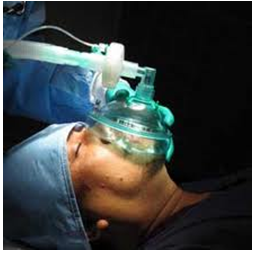What is General Anaesthesia ?
The word “anesthesia” means “without feeling pain”.
Anesthesia stops you feeling pain and other sensations. It can be given in various ways and does not always make you unconscious.
General Anesthesia gives a state of controlled unconsciousness. It is essential for some operations. You are unconscious and feel nothing.
Who gives General Anaesthesia ?
Worldwide anesthesia is administered by anesthesiologist with specialist training who;
Worldwide anesthesia is administered by anesthesiologist with specialist training who;
Discuss types of anesthesia with you and find out what you would like, helping you make choices
Discuss the risks of anesthesia with you
Agree a plan with you for your anesthetic and pain control
Are responsible for giving your anaesthetic and for your well being and safety throughout your surgery
Plan your case, if needed in the Intensive Care Unit
Make your experience as pleasant and pain free as possible.
Am I fit enough to be given anasthesia ?
Anesthesia can be given to most patients. Your anesthesiologist will meet you before your operation and will ask you about your health. He will review your health and medications. A detail will also be made on allergies to medications, serious illnesses in the past, previous problems with anaesthetics and about loose teeth. Sometimes the doctor may postpone the operation until you are in better health. For example, your anesthesiologist may want to have your blood pressure or diabetes controlled first.
There are a few things you can do to reduce anesthetic risk: Stop Smoking: If you smoke, giving up several weeks before the operation reduces the risk of breathing problems. The longer you can give up before hand, the better. If you cannot stop smoking completely, cutting down will help.
If you are over weight, reducing your weight will reduce many of the risks of having an anaesthetic.
If you have loose teeth or Crowns treatment from your dentist may reduce the risk of damage to your teeth if the anaesthesiologist needs to put a tube in your throat to help you breathe.
On the day of the operation:
Nothing to eat or drink – fast (‘Nil by Mouth”) it is important not to take any solid food 8 hours prior to surgery. If there is food or liquid in your stomach during your anesthetic,
it could come up to the back of your throat and damage your lungs.
If you are taking medicines, you should continue to take them as usual, unless your anesthesiologist or surgeon has asked you not to. Medicines ordered by your anesthesiologist can be taken with a sip of water just before the operation.
If you feel unwell please inform the doctors so that remedial action can be taken.
When you are called for your operation ?
A member of the staff will go with you to the Operation Room (OR).
You will have to remove your dentures, hearing aids, glasses. Jewellery will have to be removed. If you cannot remove your jewellery, it can be covered with tape to prevent damage to it or your skin.
You will be shifted to the OR on a trolley.
The OR staff will check you name, age and details of your medical records to make sure you are having the right operation.
Before the start of the operation, the anaesthesiologist and OR nurse will attach certain monitors to ensure you are properly monitored. The routine monitors are
An ECG monitor – to monitor your heart rate and its electrical activity.
A blood cuff around your upper arm to check your blood pressure
A pulse oximeter to measure the amount of oxygen to measure the amount of oxygen in the blood.
General anesthesia is usually started by injecting a drug into a vein through a cannula, which will make you unconscious.
At the same time, a mask which supplies oxygen and special anesthetic gases will be placed over your nose and mouth. Once you are unconscious a tube may be placed in your throat to help you breathe. This may make your throat sore for a day or two after you wake up.
After the surgery, the anesthesiologist will wake you up. You may feel drowsy or nauseous after the surgery. The doctor will give you some medicines to help you overcome this.
You will remain in the OR till you are completely awake. When satisfied that you have recovered safely from your anesthetic you will be taken back to the ward.
Pain relief and afterwords
Good pain relief is important so that your recovery is faster. It is easier to relive pain before it gets bad occasionally; pain is a warning sign that all is not well, so you should ask for help
when you feel pain. Some ways of giving pain relief:
Pills, tablets or liquids to swallow Injections – often given into the vein or muscle
Suppositories
Local anaesthetics and regional blocks.
How you feel afterwards depends on the type of anesthetic and surgery. You should not drive a car or operate machinery for 24 hours after your anesthetic.

